| کد مقاله | کد نشریه | سال انتشار | مقاله انگلیسی | نسخه تمام متن |
|---|---|---|---|---|
| 5063906 | 1476704 | 2016 | 12 صفحه PDF | دانلود رایگان |
- We examine the nexus between real GDP, fossil and non-fossil fuel use
- Four subsamples were anlysed: developed exporters, developed importers, developing exporters and developing importers
- Bidirectional causality was found between fossil fuel use and real GDP for most of the subsamples
- We concluded that efforts to directly conserve fossil fuels may harm economic growth
This study employs a Pooled Mean Group estimator to examine the nexus between economic growth and fossil and non-fossil fuel consumption for 53 countries between 1990 and 2012. The global sample was divided into four categories: developed exporters, developed importers, developing exporters and developing importers. The purpose of these categories was to observe whether factors unique to these countries influence the relationship between energy consumption and economic growth. With the exception of developing importers, evidence of bi-directional causality between fossil fuel consumption and real GDP across all subsamples is observed. This leads to the conclusion that efforts to directly conserve fossil fuels may harm economic growth. In terms of non-fossil fuel use, the results are more diverse. Bi-directional causality between non-fossil fuel use and real GDP is found in the long and short run for developed importers; bi-directional causality only in the long run for developed exporters; negative long-run causality from real GDP to non-fossil fuels for developing exporters; and long-run causality from non-fossil fuel use to real GDP for developing importers. These results lead to the conclusion that other factors have been responsible for the progress seen in non-fossil fuel use. Thus it is concluded that economic growth on its own is insufficient to promote clean energy development. There is a need for policy makers to create an environment conducive to renewable energy investment.
Journal: Energy Economics - Volume 60, November 2016, Pages 345-356
